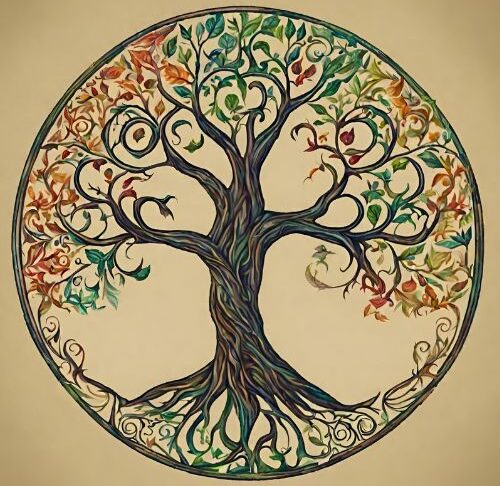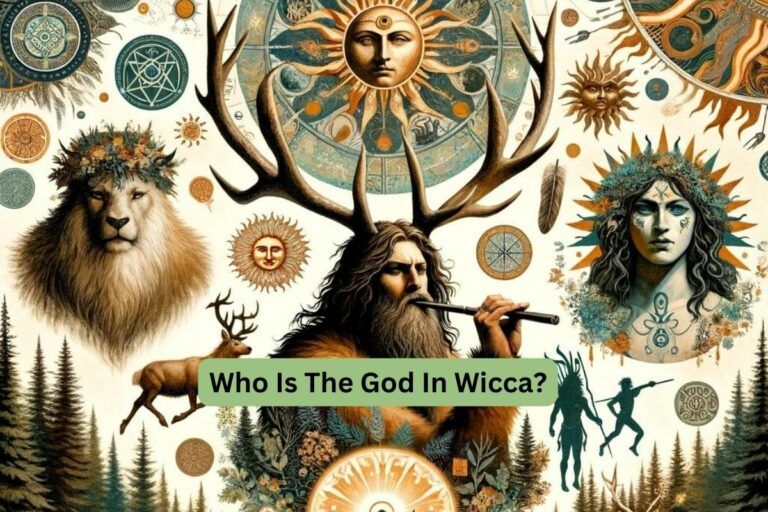- Wicca often features a God alongside a Goddess, representing the masculine divine principle.
- The God is frequently depicted as the Horned God, associated with nature, wilderness, and the life cycle.
- He takes many forms, drawing inspiration from deities like Cernunnos and Pan.
- Some Wiccans see the God as a specific deity, while others view him as an archetype.
In Wicca, there’s often a God along with a Goddess. The God represents the masculine side of things, kind of like a balance to the feminine Goddess. This God is often called the Horned God and is connected to nature, wild places, and the whole circle of life, death, and coming back to life again.
The Duality of Wiccan Deities

In many Wiccan traditions, they honor both a Goddess and a God, who represent the feminine and masculine energies present in the world. They see their deities as equal partners, working together to create and maintain the natural cycles of life.
The Goddess is usually associated with traits like nurturing, intuition, and the moon, while the God is linked to things like strength, action, and the sun.
This balance of masculine and feminine energies is important to Wiccan beliefs. It shows that both forces are necessary and that they work together. It’s a great way to view the world and our place in it.
Wiccans honor both the Goddess and the God in their practices. Learning about the importance of these deities and the parts they play is an exciting part of discovering this spiritual path.
The Horned God
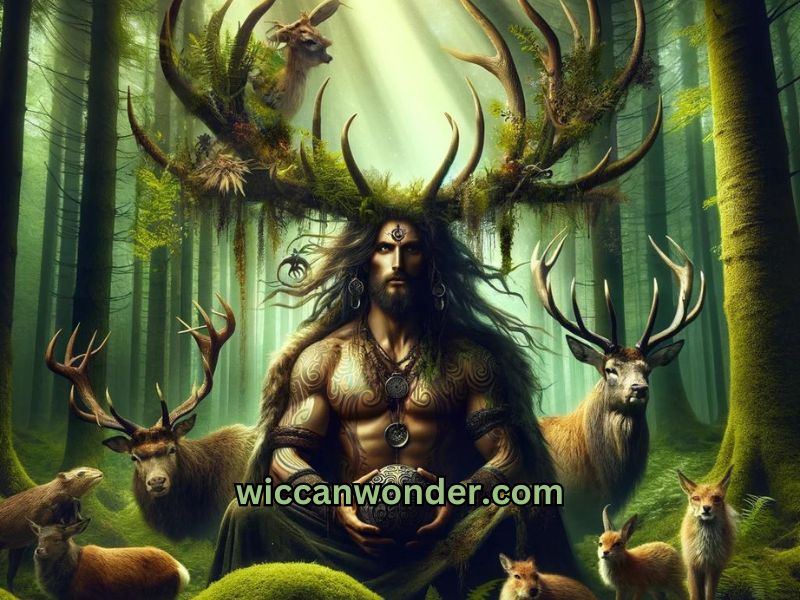
The Horned God is a powerful figure who represents the masculine divine energy in Wicca. He’s often seen with antlers or horns like a deer and sometimes with legs and hooves like a goat. He isn’t scary or evil. He represents the wild, natural parts of the world.
He represents the energy of the forest, the excitement of hunting, and the power of animals. He’s often connected with the Sun, and his energy is strongest at the summer solstice when the days are longest and the Sun is at its most powerful.
But The Horned God isn’t just about being strong and full of life; he also represents the natural cycle of living, dying, and rebirth. Just like a deer loses its antlers and grows new ones every year, the Horned God goes through a symbolic death and rebirth.
🌿 Attributes of the Horned God 🌿 |
||
|---|---|---|
| Attribute | Description | Symbolism |
| Antlers | Representing his connection to wildlife and the forest. | 🦌 Strength and Renewal |
| Forest | His domain, symbolizing untamed nature and wilderness. | 🌲 Growth and Mystery |
| Animals | Depicts his role as protector of creatures great and small. | 🐾 Instinct and Community |
| Sun | Illustrates his aspect as a solar deity, bringing light and warmth. | ☀️ Life and Vitality |
| Cycle of Life and Death | Symbolizes the natural cycles of existence. | ♻️ Renewal and Transformation |
| Strength | Embodies physical and moral fortitude. | 💪 Protection and Courage |
| Wilderness | Represents the untamed, natural world and its mysteries. | 🌳 Freedom and Exploration |
| Brought to You by “wiccanwonder.com” | ||
The stories and symbols of the Horned God can produce a strong connection for many people. He can be a powerful friend and guide, helping you find your inner strength, bravery, and wildness. Whether you include him in rituals, meditation, or as a source of inspiration, the Horned God can be a helpful companion.
Many Faces of the God

The Horned God is a popular image of the male divine in Wicca, but Wiccans also see the God in many other ways, each with their own qualities and tales.
Some Wiccans relate to the God through gods from old cultures, like Cernunnos from the Celts, who is often tied to nature and the wild, or Pan from the Greeks, who is linked to the wilderness, shepherds, and herds. Lugh, an Irish god known for his many skills and connection to the sun and light, is also important to some Wiccans.
These are only a handful of examples, but there are many more gods from various cultures that Wiccans might view as types of the male divine. Some might concentrate on gods of the sun, hunting, or farming, while others might feel a connection to gods associated with wisdom, magic, or healing.
The many faces of God in Wicca highlight how diverse and deep this idea is. Each form of the God has its own stories and lessons that help people connect with the male aspect of the divine in special ways.
Different Wiccan Views

Wiccans have different ideas about what the God is like. Some think of the God as a real being with his own personality and traits. They might include him in rituals, pray to him, or try to form a bond with him like they would with a friend or guide.
Others see the God as a symbol or idea. They might view him as a representation of male energy in the world, such as the strength of the sun, the wildness of nature, or the power of an animal. For them, the God is more of a concept they can relate to in their own way.
Both of these views are okay. What’s most important is how each person understands and connects with the God in their own spiritual practice. There’s no single correct approach.
The various ways Wiccans perceive and interact with God highlight the diversity and individuality within this path. Whether someone sees God as a separate being or as a symbolic force, what truly matters is the connection and significance they find in that relationship.
The God in Ritual and Practice
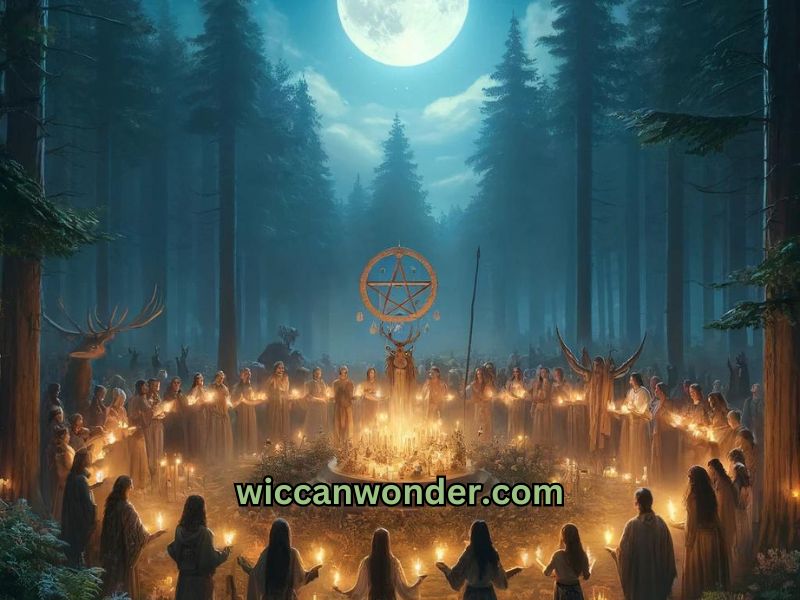
The God is a big part of Wiccan rituals and practices. He is often honored and celebrated together with the Goddess, balancing male and female energies.
Many rituals use symbols or tools that represent the God, such as antlers, a spear, or a candle for the sun. Prayers asking for his energy and blessings are also common.
During the Wheel of the Year, which is the Wiccan calendar of seasonal holidays, the God is often connected to certain festivals. For example, on May Day (Beltane), he is sometimes shown as the Green Man, a symbol of growth and new life. At the first harvest (Lughnasadh), he is honored for his strength and power. At Halloween (Samhain), he is linked to the final harvest and the mysteries of death and rebirth.
When participating in rituals that honor the God, people may focus on traits like strength, courage, action, and change. They might ask for his help with challenges that require a brave approach or for guidance in areas of life where they want to grow and change.
As people develop their own Wiccan practice, they find ways to connect with the God that are special to them. This can include making their own prayers, using symbols or images that represent his energy, or simply taking time to appreciate his presence in nature. Remember, your relationship with the God is unique, and the most important thing is to approach it in a way that feels real and strong to you.
Frequently Asked Questions
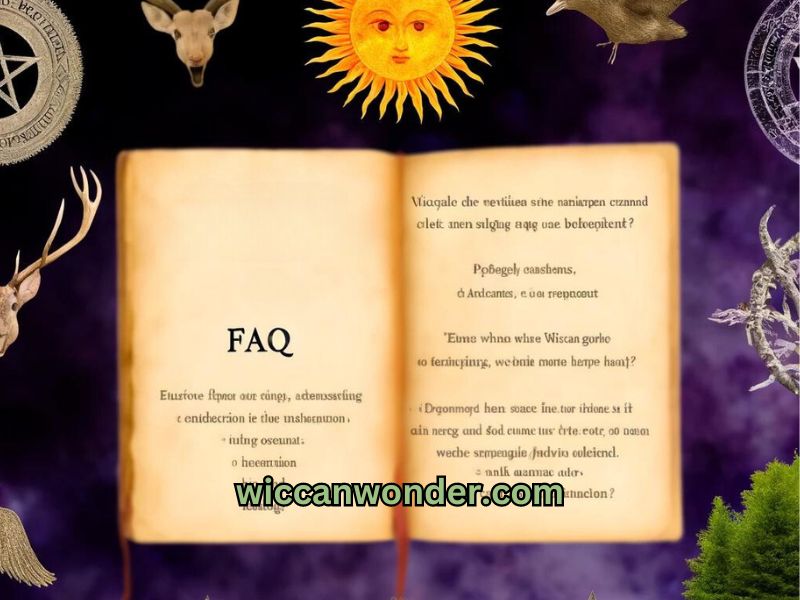
Q: Is the Wiccan God evil because he’s horned?
A: Not at all! The horns are symbolic of the God’s connection to nature and the wild, untamed aspects of the world. In Wicca, horns are not associated with evil or negativity. Instead, they represent the God’s power, fertility, and his role as a guardian of the natural world.
Q: Do all Wiccans believe in a God?
A: While many Wiccans honor both a Goddess and a God, there’s a lot of diversity in Wiccan beliefs. Some Wiccans may focus more on the Goddess, following a goddess-centered path. Others might be drawn to a particular god or goddess from a specific culture or mythology. Some Wiccans also view the divine as a single, universal force rather than as a distinct deity.
Q: Can I connect with the God even if I’m not Wiccan?
A: Absolutely! The concept of a masculine divine force exists in many spiritual traditions and paths. Even if you don’t identify as Wiccan, you can still explore and connect with the energy and symbolism of the divine masculine in a way that resonates with you. This could involve learning about gods from different cultures, spending time in nature, or engaging in practices that help you tap into qualities like strength, courage, and action.
Final Thoughts

Learning about the God in Wicca can be an exciting adventure that helps you better understand and value this spiritual path. Whether you want to know more about the Horned God, the various ways different cultures show the male divine, or how male and female energies work together in Wiccan rituals, there’s so much to discover and enjoy.
As you learn more about the God and how he is honored in Wicca, remember that your bond with the divine is special and unique to you. Listen to your heart and let it guide you to the aspects of God you connect with the most.
Take the time to explore the stories, symbols, and rituals about the God. Don’t be afraid to ask questions or search for more information to help you on your journey. The more you engage with the concept of the God in Wicca, the more you’ll understand and appreciate his importance in this beautiful, nature-loving spirituality.
What part of the Wiccan God sparks your interest the most? Please leave me a comment and share your thoughts!
Blessed Be!
Taianne
Share the Love

Welcome to WiccanWonder.com!
I’m Taianne, your guide on this enchanting journey into the realm of Wicca and witchcraft. Inspired by the magical stories of pop culture, I’ve transitioned from a casual fan to a dedicated explorer of Wicca’s true nature—a nature-based religion celebrating the divine, the cycles of nature, and living harmoniously with the earth. Through WiccanWonder.com, I aim to demystify Wicca, separating fact from fiction, and inviting others to explore its rich traditions and practices alongside me. As a fellow seeker, I’m here to share insights, discoveries, and open a space for dialogue and learning. Whether you’re new to Wicca, a seasoned practitioner, or simply curious about magic and spirituality, your presence enriches our journey. Let’s explore the wonder of Wicca together.
Feel free to contact me at Taianne@wiccanwonder.com
Blessed be!
